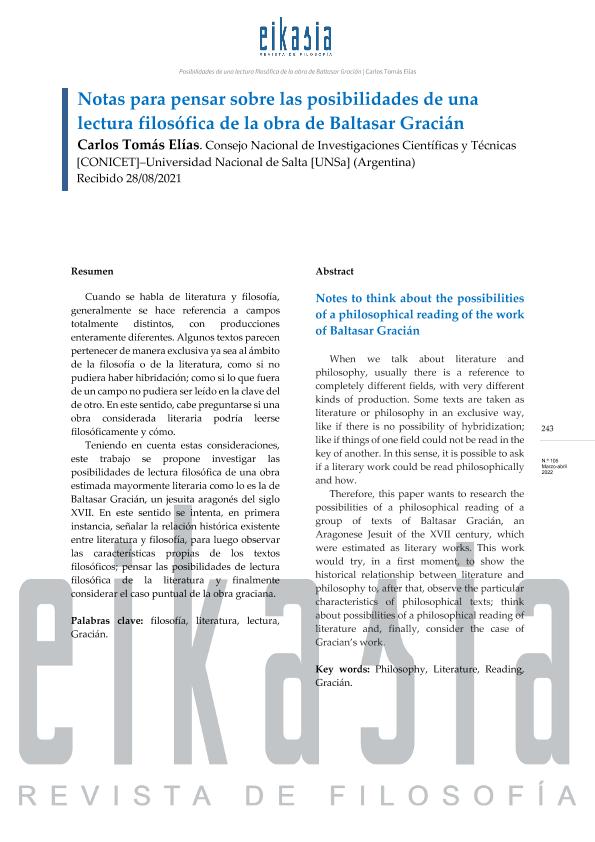Mostrar el registro sencillo del ítem
dc.contributor.author
Elías, Carlos Tomás

dc.date.available
2022-06-23T13:50:23Z
dc.date.issued
2022-03
dc.identifier.citation
Elías, Carlos Tomás; Notas para pensar sobre las posibilidades de una lectura filosófica de la obra de Baltasar Gracián; Eikasia Ediciones; Eikasia; 105; 3-2022; 243-260
dc.identifier.issn
1885-5679
dc.identifier.uri
http://hdl.handle.net/11336/160325
dc.description.abstract
Cuando se habla de literatura y filosofía, generalmente se hace referencia a campos totalmente distintos, con producciones enteramente diferentes. Algunos textos parecen pertenecer de manera exclusiva ya sea al ámbito de la filosofía o de la literatura, como si no pudiera haber hibridación; como si lo que fuera de un campo no pudiera ser leído en la clave del de otro. En este sentido, cabe preguntarse si una obra considerada literaria podría leerse filosóficamente y cómo.Teniendo en cuenta estas consideraciones, este trabajo se propone investigar las posibilidades de lectura filosófica de una obra estimada mayormente literaria como lo es la de Baltasar Gracián, un jesuita aragonés del siglo XVII. En este sentido se intenta, en primera instancia, señalar la relación histórica existente entre literatura y filosofía, para luego observar las características propias de los textos filosóficos; pensar las posibilidades de lectura filosófica de la literatura y finalmente considerar el caso puntual de la obra graciana.
dc.description.abstract
When we talk about literature and philosophy, usually there is a reference to completely different fields, with very different kinds of production. Some texts are taken as literature or philosophy in an exclusive way, like if there is no possibility of hybridization; like if things of one field could not be read in the key of another. In this sense, it is possible to ask if a literary work could be read philosophically and how. Therefore, this paper wants to research the possibilities of a philosophical reading of a group of texts of Baltasar Gracián, an Aragonese Jesuit of the XVII century, which were estimated as literary works. This work would try, in a first moment, to show the historical relationship between literature and philosophy to, after that, observe the particular characteristics of philosophical texts; think about possibilities of a philosophical reading of literature and, finally, consider the case of Gracian’s work.
dc.format
application/pdf
dc.language.iso
spa
dc.publisher
Eikasia Ediciones
dc.rights
info:eu-repo/semantics/openAccess
dc.rights.uri
https://creativecommons.org/licenses/by-nc/2.5/ar/
dc.subject
FILOSOFÍA
dc.subject
LITERATURA
dc.subject
LECTURA
dc.subject
GRACIÁN
dc.subject.classification
Otras Filosofía, Étnica y Religión

dc.subject.classification
Filosofía, Ética y Religión

dc.subject.classification
HUMANIDADES

dc.title
Notas para pensar sobre las posibilidades de una lectura filosófica de la obra de Baltasar Gracián
dc.title
Notes to think about the possibilities of a philosophical reading of the work of Baltasar Gracián
dc.type
info:eu-repo/semantics/article
dc.type
info:ar-repo/semantics/artículo
dc.type
info:eu-repo/semantics/publishedVersion
dc.date.updated
2022-06-21T18:32:06Z
dc.journal.number
105
dc.journal.pagination
243-260
dc.journal.pais
España

dc.journal.ciudad
Oviedo
dc.description.fil
Fil: Elías, Carlos Tomás. Consejo Nacional de Investigaciones Científicas y Técnicas. Centro Científico Tecnológico Conicet - Salta; Argentina. Universidad Nacional de Salta. Facultad de Humanidades; Argentina
dc.journal.title
Eikasia
dc.relation.alternativeid
info:eu-repo/semantics/altIdentifier/url/https://revistadefilosofia.org/numero105.htm
Archivos asociados
